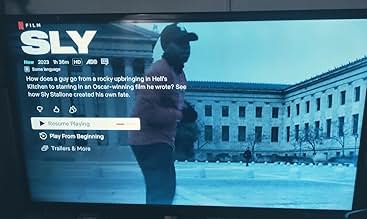Sylvester Stallone executive produces -- meaning approves or disapproves -- the documentary examining his own life and work.
That's red flag number one. Even in an age of ubiquitous "documentaries" (they used to barely exist in the margins of filmmaking), such a project should aspire to illuminate its subject, warts and all.
Here, Sly makes an attempt at a mea culpa, lamenting how he should have spent more time with his family, yet inclusion of that family's story scarcely exists. I had no idea his son, Sage Stallone, had died in 2012 at age 36. And the only reference to that here are life dates shown on screen after the brief segment about Sage appearing in the ill-received Rocky V.
And what about Stallone's other son, Seargeoh? Yes, that's right, Stallone had two sons, and Seargeoh apparently was diagnosed with autism at the age of three. Not that the documentary reveals that -- Seargeoh is never even mentioned; I found out only by searching online, and only after an image of the actor Milo Ventimiglia (who plays Rocky's grown-up son in 2006's "Rocky Balboa") inexplicably appeared beside the name "Seargeoh Stallone" when I Googled it. Try it. You'll see.
The real Seargeoh, apparently, has lived most of his life with his mother, Sasha Czack, now Stallone's ex.
Okay, maybe it's to protect the privacy of his children, and that's fine. But it's a conspicuous absence in a documentary ostensibly about a man's life. Which it is, to a large extent, especially about his childhood, and how his physically abusive (Sly implies this, though never directly says it) and "brow-beating" father may have pushed him to seek external validation from an audience, or crowd.
But the picture really focuses on the work, the ups and downs of Stallone's career, his regrets and his massive successes, and the way his two big franchises, especially the Rocky narrative, are really mirrors for his own life and career. Where this gets the most interesting, at least for this viewer, was when Stallone described these two world-famous characters as ends of a spectrum. Rambo is the broken hero with no home who dies alone. Rocky embraces humanity, and family, and is in turn embraced. Stallone admits he's both characters.
In "Sly," I appreciated this emphasis on the work. I make my own living as a suspense writer, have worked in film, and in my own much smaller and less famous way, have experienced a lot of the frustrations and joys. Every artist does, really. This telling of Sly's life seems like a letter to all artists, that they may aspire to such greatness at their own peril. That even with great success they may, like Sly, be left searching for inspiration, hoping to slow life down, hoping for another good fight.







































